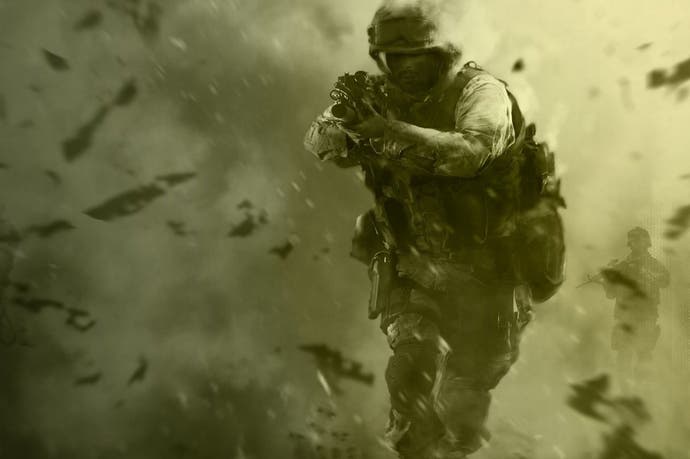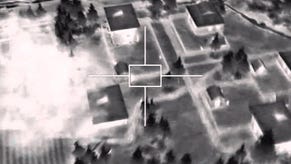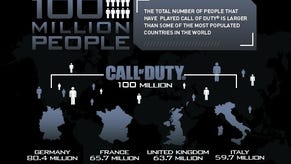The seven year shadow left by Modern Warfare
Nuclear code.
It's difficult to look Modern Warfare in the eye without glancing at the long shadow that trails behind it. The small library of gradually worsening sequels and annual follow-ups, the abysmal Medal of Honor games and all the other middling to poor efforts at competition that defined the next half-decade of first-person shooters ( Terrorist Takedown anyone?).
There's a sense that the modern/near-future warfare craze was more than a little distasteful. A celebration of controversial glories, entertainment riffing off conflicts and disasters from which the sand had barely settled. It's perhaps why the frankly average shooter Spec-Ops: The Line generated so much discussion simply by addressing the ethically dubious qualities found within these games.
This entire genre shift, and all the issues that came with it, can be traced back to Modern Warfare. Yet despite its legacy I've always felt that Infinity Ward's first attempt at translating Call of Duty into a contemporary setting stood apart from the mess that later games made of it. Firstly because in design, pacing and execution it soars above anything that followed in its wake. But it's also down to how Modern Warfare deals with the subject matter.
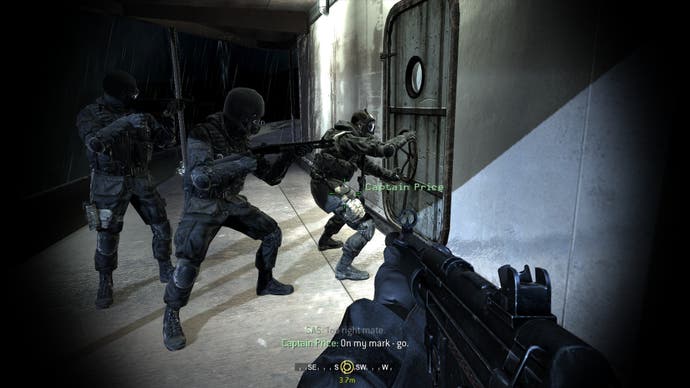
From its opening cargo-ship raid to the closing hostage-rescue on a passenger jet, Modern Warfare is a masterfully crafted action game. The intense battles of the world war 2 era games are relocated to the sand-blasted alleyways of a middle-eastern dictatorship, with tense spec-ops raids that reign in the action to brief bursts of gunplay, relying on atmosphere and deftly-weaved scripts to keep the player invested. As the game progresses, it gradually combines the two, zooming in upon those spec-ops agents but upping the ante of their engagements.
It's tempting to remember Modern Warfare by ticking off its 'best bits'. The first time you use night-vision to take out partisans stumbling about in the dark, the mission that sees you in control of an AC-130 surveillance plane, the A-bomb explosion, the player-character demise which the sequels regurgitated ad-nauseam, the two missions set in Pripyat, generally accepted as the game's high-point. Yet while these might be the moments that make Modern Warfare memorable, they aren't what made it enjoyable to play.
Credit for that belongs to the level design. For all its spectacular set-pieces, Modern Warfare never forgot that what makes a shooter interesting is angles and AI. Although it doesn't have the mazy majesty of Doom, Modern Warfare always gives you enough room in the level design to approach a combat scenario in various ways. This is particularly the case in the early Marine missions, where the twisting streets and multi-storey buildings enable you to flank opponents and use height to gain an advantage.
This is not to dismiss Infinity Ward's efforts at choreography, but to observe that its missions and set-pieces take place within a sequence of tiny sandboxes. A good example of this is the level enticingly named "The Bog", which involves the player moving through a tracer-lit city at night to aid a tank (Codename: Warpig) that has become mired in mud. It's a mission that involves clearing out a machine gun placement in a tower-block battering your position on the highway, destroying tanks with a Javelin missile launcher from beneath a different, elevated highway (a subtle and clever inversion), before arriving at the titular slough. This is the scene for a furious, protracted night battle where the player must criss-cross the churned earth under the crimson glow of flares to destroy an anti-air gun and call in much-needed helicopter support.
Modern Warfare is structured in a way that reminds me of the coastline paradox . The campaign is divided into missions which are divided into different scenarios which are divided again between several objectives, all of which bear unique traits and vignettes designed to stick in your mind, even if it's something as simple as a pair of Marines pushing forward a steel rubbish bin as mobile cover, or the opportunity to save an old man from being pointlessly executed by paramilitaries. The closer you examine it, the more detail emerges and the larger the picture becomes.
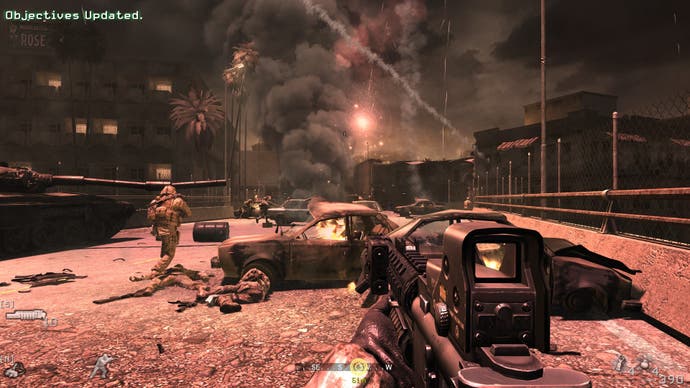
No part of the game epitomises this better than the second act. Infiltrating an Ultranationalist-occupied village harbouring the A-bomb triggering President Assad gives way to Price's memory of creeping through Pripyat's ruins in 'All Ghillied Up'. Here the dulcet Scottish tones of Captain Macmillan guide you through the desaturated wilderness surrounding the abandoned city. He instructs you on your every move and chastises you if you make a mistake. "You lead a charmed life lieutenant" he says if you are spotted by the enemy and come out unscathed.
What follows completely reverses the situation. Your stealthy approach is thrown out the window in favour of a mad dash to the extraction point. Pursued by dozens of soldiers, the power relationship between yourself and Macmillan is inverted after he's injured when a helicopter crashes on his legs (have YOU had an accident at work?) forcing you to carry him through the city's crumbling structures. After a thrilling Alamo-style finale where the two snipers fend off a small army beneath the city's most famous landmark - the Ferris wheel - we're wrenched back into the present, where Price and his team perform another daring act of escapology, this time from the village which they attacked the night before. This entire section of the game is an ingenious series of running themes which are carefully layered and wryly transposed.
Toward the end events turn a little more 80s-action movie. "It's quite simple. Either we retake the launch facility or we won't recognise the world tomorrow," Price summaries. I love how he refers to sneaking into captured nuclear silo bristling with soldiers and stopping terrorist leader Imran Zakhaev from introducing western civilisation to a new kind of winter as "quite simple." It isn't the first time the game's characters respond to imminent annihilation with a workmanlike shrug. A civil war in Russia with 15,000 nukes at state? "Just another day at the office," quips Price. A crucial informant held captive by Ultranationalist rebels? "We're gonna walk him out," he assures. Ambushing an arms-deal in irradiated Pripyat? It's simply "wetwork".
I think it's this matter-of-fact attitude that saves Call of Duty from feeling jingoistic. The idea behind the series was always about putting you in the shoes of an ordinary soldier in extraordinary circumstances, and although Modern Warfare's SAS squaddies may be above average in their capabilities, their responses to the situations are little different from those of a plumber fixing a burst pipe.
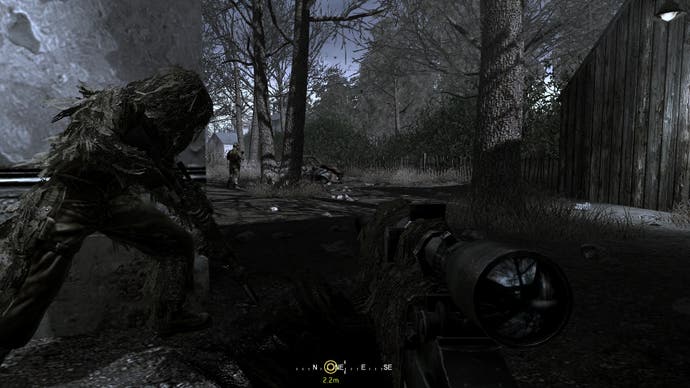
Perhaps it's sociopathic, but it's preferable to the tone of the sequels. It's worth playing the first half hour of Call of Duty 4 and Modern Warfare 2 back-to-back just to see how striking that difference is. I know all the cool cats hate Call of Duty now and I don't want to rag on the later games too much, but there is one example that I think epitomises the contrast. In the cutscene prior to Modern Warfare's final act, Imran Zakhaev gives a grandiose speech: "Our so-called leaders prostituted us to the West. Destroyed our culture. Our economies. Our honour." In Modern Warfare 2, it's Price himself doing the nonsensical oration. "This is for the record. History is written by the victor. History is filled with liars."
It's a world away from his understated manner in the first game. Modern Warfare's cast are characterised as soldiers, not heroes. And while obviously we see everything from their perspective, the game doesn't encourage us to judge their actions in any particular way. It allows us room for interpretation.
There's one point at which Modern Warfare slips from a fairly amoral standpoint toward social commentary, and that's the AC-130 mission. Here the player takes control of a flying artillery gun to protect Price and his squad as they move through enemy territory. Flying above the wispy clouds, the black-and-white thermal visuals of the plane's cameras distance you from the thunderous violence taking place on the ground. Throughout the mission the plane's American operators laugh and joke about the deaths of their targets. "Good kill, good kill. I see lots of little pieces down there" remarks one. "This is gonna be one hell of a highlight reel," muses another.
Seven years on, it still stands out. Video games have long held a fascination with war, but here we see war played like a video game. And the disconnect, the casual dismissal of what's going on. Well, it's horrific. I don't know for certain whether Infinity Ward intended it to be read that way, but it certainly highlighted to me why the two should never be confused. And as modern warfare (as opposed to Modern Warfare) moves evermore from boots on the ground to drones in the sky, with gamers being recruited as remote pilots, what in 2007 was pastiche now looks more like prophecy, which makes Modern Warfare all the more brilliant, and the shadow it cast behind it all the more terrifying.
